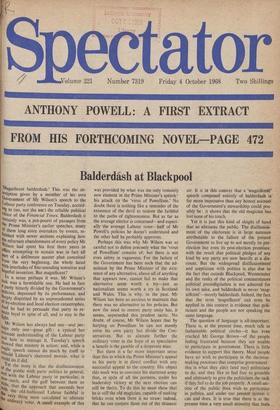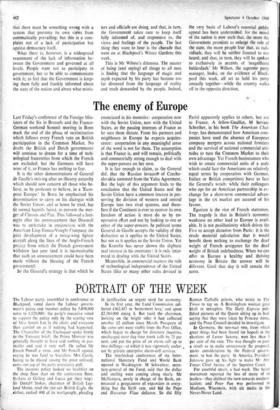In a sense perhaps it was. Mr Wilson's task was
a formidable one. He had to face a Party bitterly divided by the Government's Policies, depressed by its performance, and deeply dispirited by an unprecedented series by-election and local election catastrophes. And he had to persuade that party to re- main loyal in spite of all, and to stay in the fight. was provided by what was the only remotely new element in the Prime Minister's speech : his attack on the 'virus of Powellism.' No doubt there is nothing like a reminder of the existence of the devil to restore the faithful to the paths of righteousness. But as far as the average elector is concerned—and especi- ally the average Labour voter—half of Mr Powell's policies he doesn't understand and the other half he probably approves.
Perhaps this was why Mr Wilson was so careful not to define precisely what the 'virus of Powellism' consists of; but there is not even safety in vagueness. For the failure of the Government has been such that the ad- mission by the Prime Minister of the exis- tence of any alternative, above all of anything that appears new, cannot fail to make that alternative seem worth a try—just as nationalism seems worth a try in Scotland and Wales. This is why, in the past, Mr Wilson has been so anxious to maintain that there was no alternative to his policies. But now the need to restore party unity has, it seems, superseded this prudent tactic. No doubt, of course, Mr Wilson hopes that by harping on Powellism he can not merely unite his own party but divide the Con- servatives. But to alienate further the ordinary voter in the hope of so speculative a benefit is the gamble of a desperate man. that there must be something wrong with a system that prevents its own views from automatically prevailing; but this is a com- plaint not of a lack of participation but against democracy itself.
What there is, however, is a widespread resentment of the lack of information be- tween the Government and governed at all levels. People want not to participate in government, but to be able to communicate with it; to feel that the Government is keep- ing them fully and frankly infonned about the state of the nation and about what minis- ters and official.* are doing, and that, in turn, the Government takes care to keep itself fully informed of, and responsive to, the views and feelings of the people. The last thing they want to hear is the charade that went on at Blackpool's Winter Gardens this week.
This is Mr Wilson's dilemma. The master of being (and saying) all things to all men is finding that the language of magic and myth expected by his party has become too far divorced from the language of reality and truth demanded by the people. Indeed, the very basis of Laboufs essential public appeal has been undermined; for the mood of the nation is now such that, the more the Government promises to enlarge the role of the state, the more people fear that, as indi- viduals, they will be neither listened to nor heard; and that, in turn, they will be spoken to exclusively in accents of 'magnificent balderdash.' Mr Wilson, the supreme party manager, looks, on the evidence of Black- pool this week, all set to hold his party uneasily together--while the country walks off in the opposite direction,







































